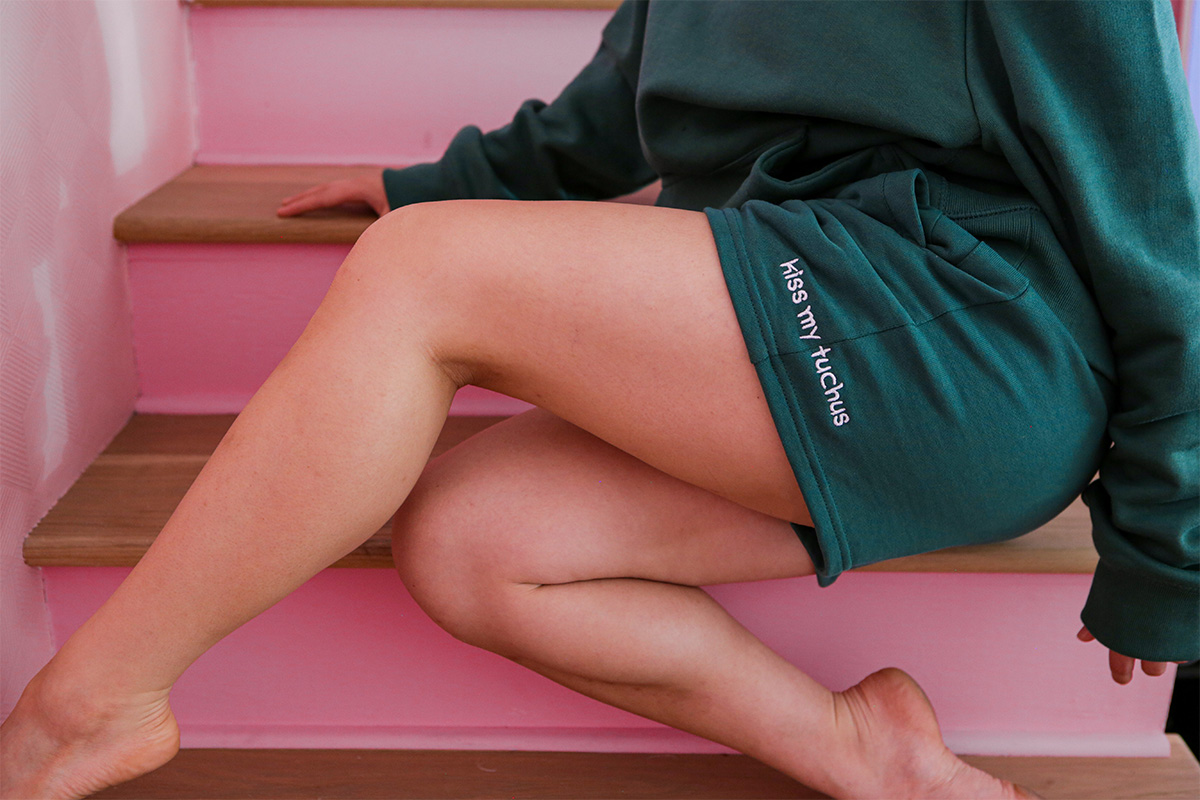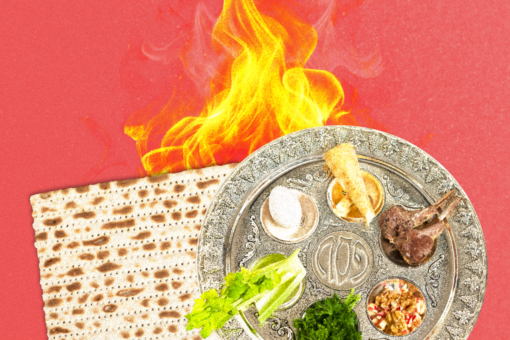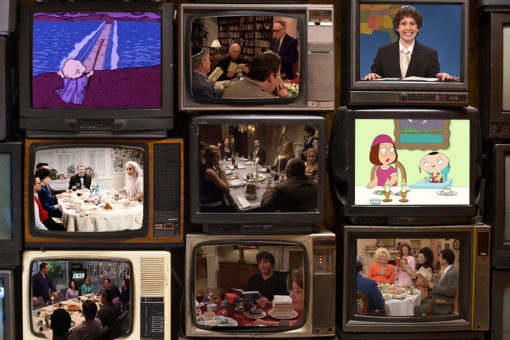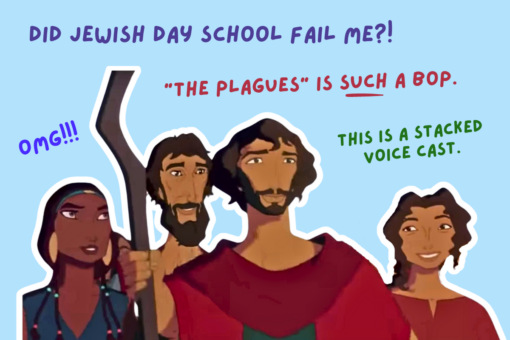Maybe it’s just me, but I find it impossible to say Yiddish words without breaking into a smile – words like bubuleh, which means “sweetheart,” for instance.
For Jordan Star, the Jewish entrepreneur behind the sustainble and genderless fashion brand bubuleh, which debuted in December 2020, that seems to be the entire point.
“We celebrate collective values, ancestries and cultures, while simultaneously celebrating our unique, individual selves — both holding enormous importance in our lives,” bubuleh’s website reads under its “Our Spiel” section.
Adding, “bubuleh is about escape and belonging all at once. We’re the halfway point between that feeling of warmth and security that comes with being around close friends and family in your comfort zone, and that risk and excitement that comes when you step out of that comfort zone.”
Jordan’s clothes seem to attest to their own Jewish joy simply by existing. With Yiddish words like “tuchus,” “faygele” and, of course, “bubuleh” on multiple products and thick, comfortable materials, clothes from bubuleh are essentially a wearable and really stylish love letter to our Jewish grandparents.
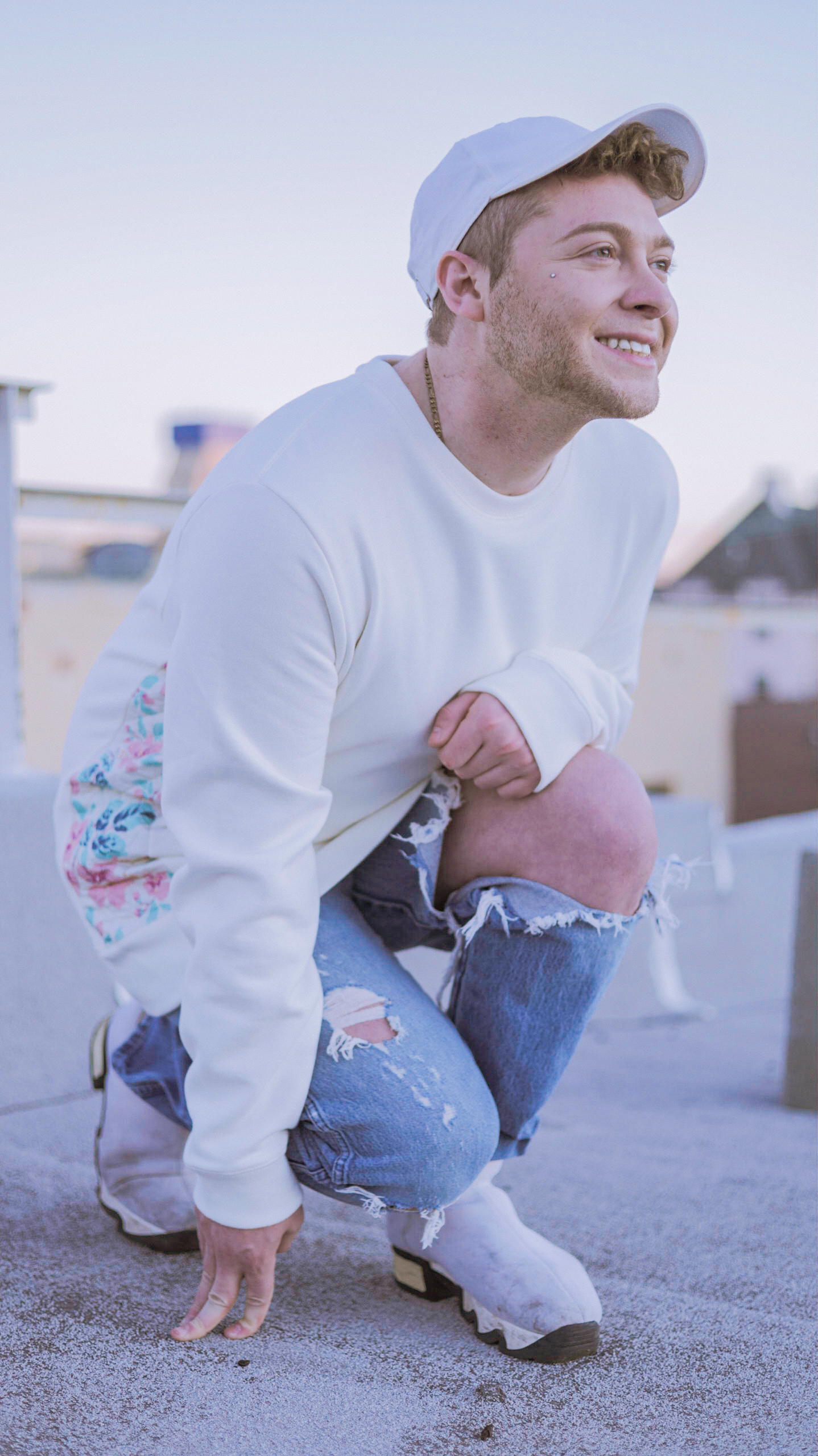
Jordan spoke with Hey Alma about the ingrained tikkun olam of bubuleh and his favorite quintessential Jewish grandma accessory.
This conversation has been edited and condensed for clarity.
Could you tell me about how bubuleh came to be?
I started bubuleh during COVID, and, in a lot of ways, because of COVID. The idea came to me because I have alway really identified with the idea of the old Yiddish spirit. I’m the type of person who goes up to people and pinches their cheeks – basically I’m a gay, Jewish guy but also like an old Jewish grandma.
During COVID, I really connected to the spirit of the nostalgia of my heritage. One, because the people who carry that heritage are my grandparents and those people in my life were so vulnerable during COVID. At the beginning of COVID I lost two grandparents and one more recently, and I really was feeling like I wanted to do something that celebrated them, because I wasn’t able to protect them. And so I was like, “What can I do that really celebrates their resilience, strength, beauty, warmth, all of that?”
Bubuleh was a word that came to mind, because it’s such a warm word that reminds me of my grandparents and older Jewish people and at the same time it’s such a strong and resilient word as Yiddish has survived against all odds. It really reminds me of how our grandparents and great-grandparents came here with nothing and were and are so strong.
And in this time period, where it’s really difficult to just exist at all, but it’s even more difficult to exist as a queer person, a Jewish person, a person of color, and any combination thereof, I felt like through tapping into that spirit of resilience we can survive because we survived before. It’s definitely a reminder that I’ve needed as of late, and that I think other people have needed as well. So I decided to create this clothing brand. Because clothing is something that we carry with us every day and you feel it, you touch it, you interact with it. And then we use soft, heavy fabrics reminiscent of hugs, which is supposed to remind you of that vintage and nostalgic feel.
Your grandparents are clearly integral to bubeleh. Can you tell me a little bit about them?
My step-grandpa passed away early on during the pandemic. Jack Kushinsky was truly the most beautiful man. He and my grandma represent so much of what I love about being Jewish. They used to take classes together and they traveled the world – not in luxurious places. They just wanted to see the world through the eyes of travelers and wanderers and continuously learn. I would come home and Jack would be like, “Jordan, have you read ‘The New Jim Crow?’” He was this 90-year-old man who learned about the prison industrial complex, and was like the most liberal and forward-thinking person, and the same with my Nana. Those two specifically have always really shown me the value of continuing education, learning different perspectives, empathizing with people who have experienced different things than you and just continually growing.
And then my Abba, who passed away somewhat recently, was incredible. I really loved him. So, there’s just a lot of warmth and unconditional love in those relationships, and that doesn’t always exist in families. Tapping into that has been really powerful for a lot of our customers.
That’s wonderful, though I’m sorry for your losses. You’ve talked a little bit about evoking nostalgia with bubuleh. What Jewish moments in your life are you nostalgic for?
Generally, I was doing research about nostalgia, and a lot of what I found shows that nostalgia actually doesn’t have to be tied to a time period that you actually existed in. For example, there’s been a lot of talk about this recently because of “Stranger Things” and ‘80s nostalgia, where a lot of the younger people watching “Stranger Things” never lived with in the ‘80s, but they’re nostalgic for the ‘80s right now. So nostalgia exists outside of experiences that you actually live through a lot of times, which I think is really interesting and what I’m trying to evoke with bubeleh.
In terms of my own experiences, growing up as I did, if I had to say one thing, I’d say I feel very nostalgic for seders – those were a really big deal in my family. Or hearing my grandparents speak Yiddish.
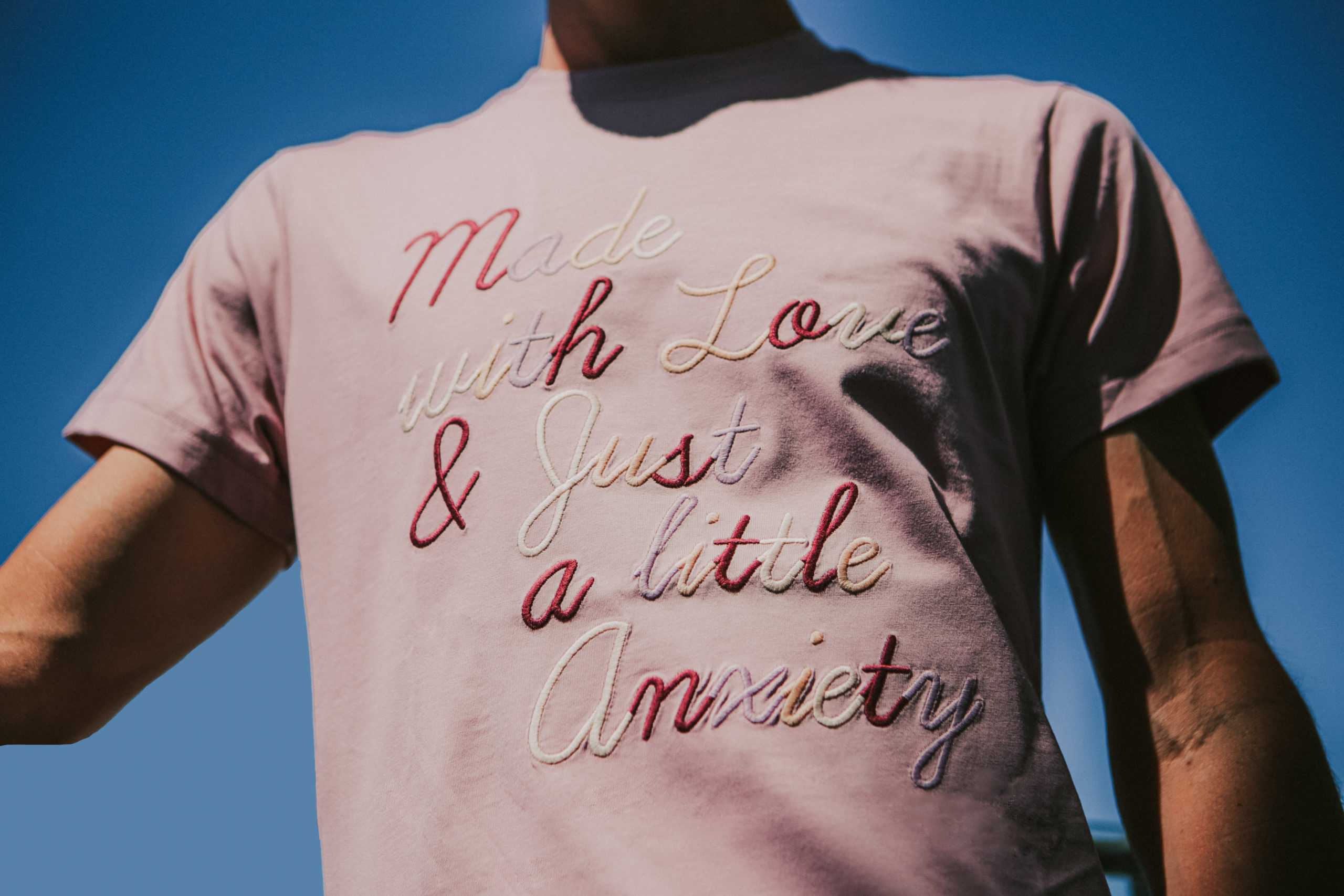
What are your favorite pieces from the bubeleh collection?
First I’ll say that there are a lot of really great items that are coming up. bubeleh doesn’t have a ton of pieces yet because I’ve bootstrapped it since the launch. I’ve been working with a modest budget and using higher end fabrics to create pieces that I like, though I can’t produce a lot of them. And I also don’t want to because we’re very much a slow fashion brand. But I really love the Anxie-Tees which just came out. Anxiety is obviously a universal thing but I think of it as still so Jewish. Our tagline is “Made with love and just a little anxiety,” which is cute but also very true for myself and a lot of other Jews, I’m sure. I also love these sweaters I came up with for the Blanket Statements collection, which were made using upcycled quilts.
Is there one particular item from bubuleh that’s hands-down the bestseller?
The bubuleh hoodies are definitely our bestsellers, and then the kiss my tuchus shorts. As someone with a non-technical fashion background, it’s taken me a while to really find the right suppliers and fabrics that meet our ethical requirements. But doing that has been so rewarding, because the hoodies are really soft, really heavy, and unique in terms of the side panels and the stitching. And people love the kiss my tuchus shorts because, of course, they’re a little kitschy. I try not to be too kitschy. I think there’s enough Yiddish kitsch, so that’s not what I’m going for. But I think people appreciate it because it’s very subtle; it has embroidery on the side. It’s a perfect accent.
I think that point of subtlety is really interesting. What you would say to people who are nervous about wearing outwardly Jewish symbols because of rising antisemitism?
Antisemitism is on the rise, but it was already crazy high even before it was on the rise. And so when I was doing research for bubuleh, I asked some people, “Is bubuleh something you’d wear?” and “What do you feel about clothing with Jewish symbols?” A lot of the feedback I got was like, I wouldn’t wear a Jewish star right now. I wouldn’t wear a chai right now. The thing is, when people don’t feel comfortable wearing Jewish symbols, I think it’s understandable. I think that’s a completely valid fear and that’s unfortunate. I think living as a proud Jew is an important thing you can do to fight against antisemitism and the history of antisemitism and say, like, fuck you to Hitler. But that doesn’t necessarily need to be done by wearing visibly Jewish symbols that might make you feel unsafe.
One of the reasons I’ve created the brand is because it’s inspired by Jewishness, but I don’t focus on Jewish symbols at all. And what I’ve heard from our customers and something I keep in mind while designing is that people may not feel comfortable wearing visibly Jewish symbols but they do feel comfortable wearing bubuleh. And, to be clear, there’s absolutely nothing wrong with wearing visibly Jewish symbols. I think that’s wonderful. But I do feel like I need to meet people where they are, and that’s where some people are. One of the cool things about wearing bubuleh is that it’s not super identifiably Jewish for people who aren’t Jewish, but bubuleh is still very proudly Jewish. Customers have told me that when they’re out wearing a bubuleh hoodie, someone will come up to them and be like, “Does your hoodie say bubuleh? Oh my God, my grandparents’ also spoke Yiddish!” Or like, “My family always called me bubuleh!” Immediately it forms this association of like, this person is safe and this person understands.
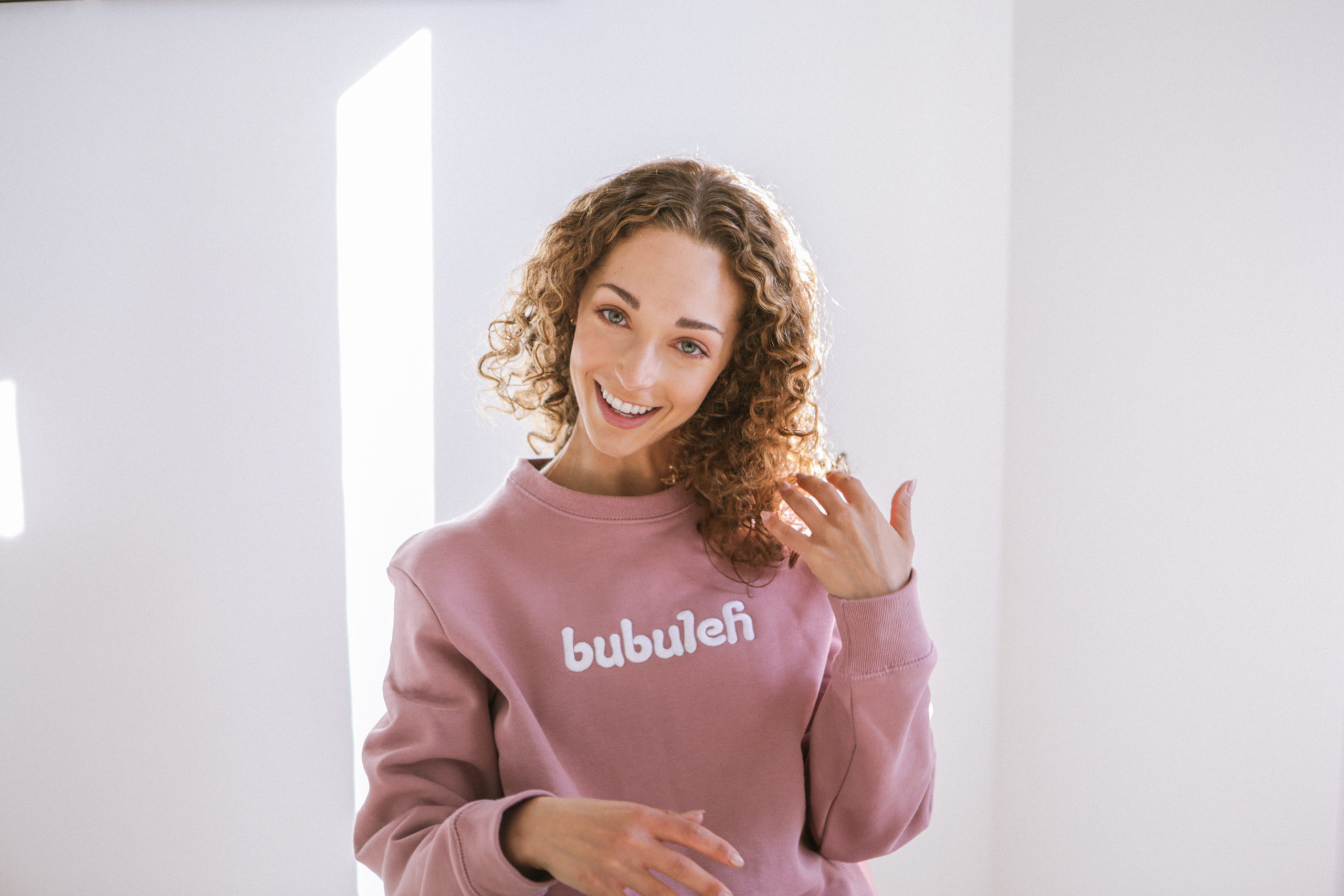
I’m curious if making bubuleh accessible to all identities as well as the fact that it’s ethically made and as carbon neutral as possible comes from a place of tikkun olam?
For sure. When I was growing up I remember being taught that tikkun olam is a core part of being Jewish. And it still is, but during my day-to-day I don’t necessarily have to think about if something is tikkun olam. It’s really just so ingrained at this point and such a part of my identity, especially as a queer Jewish person, that I’d say I’m moreso guided by tikkun olam. With bubuleh, what I really want to do is bring this feeling of warmth and joy to help people, and if any part of the business were harmful, that would be antithetical to what I want to do. For every person who touches bubuleh, I want it to be positive – and that includes the people who are making bubuleh.
Do you have any upcoming collections or new pieces?
One of the top requests by far is to do a bubuleh baby collection. So I’m working on that. And I have some one-off shirts that are coming up and some products and collections tied to things throughout the year. For example, “Hocus Pocus 2” comes out September 30 and obviously that movie is led by Bette Middler who’s such an inspiration for bubuleh. Jewish icons like Bette Middler, Joan Rivers and Barbra Streisand are such inspirations. So we’ll have a couple of things coming out that are Bette Middler-related for the “Hocus Pocus” launch. I’m also working on a schvitz athleisure collection that’s really retro inspired. which I’m super excited about. And one collection that’s still in early stages, but that I’m really excited about, is a Ruth Bader Ginsburg collection. She represents so much of what I think bubuleh is as a brand – she was liberal, she’s still a feminist icon and she was proudly Jewish. So I’m doing a collection exploring her most iconic outfits. Beyond the mesh gloves and her lace collar, there’s so much more to her visually than that.
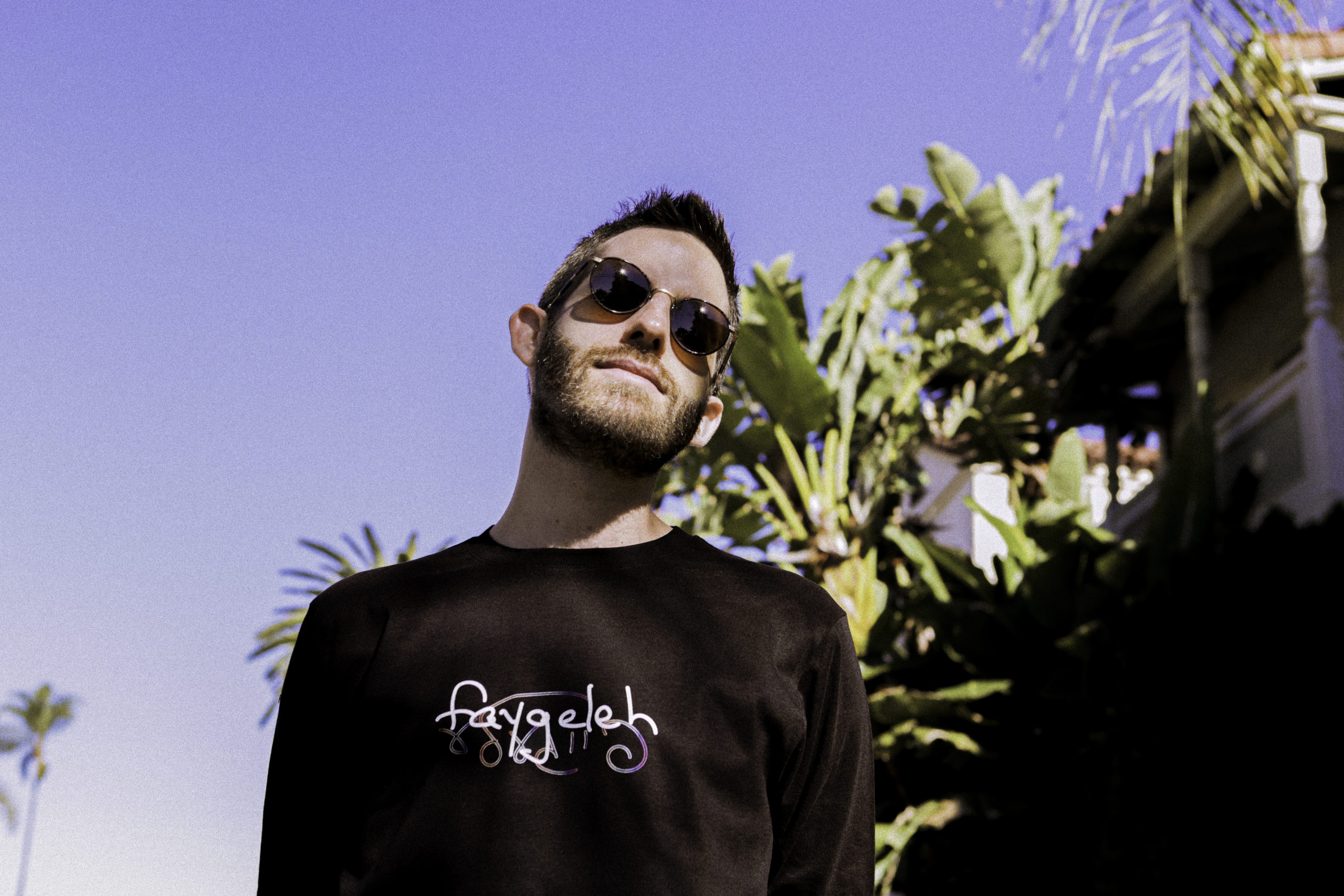
OK, last question: I love that bubuleh’s vibe is like nice Jewish boy meets older Jewish grandma, because I feel like Jewish grandmas are some of the most stylish people I’ve ever met. So I’d love to know, what is your favorite quintessential Jewish grandma accessory?
So I’ll say two things. First, I think brooches are so chic. You don’t see them a lot anymore, but I think they’re going to make a comeback. And something else I’ve been exploring and teaching myself is to crochet. And I know that’s not really an accessory, but crochet really reminds me of Jewish grandmas. I’d like to bring back older techniques and fabrics and styles. Which is actually why I love this trending coastal grandma moment we’re in now. I think people are realizing just how chic grandmas, and specifically Jewish grandmas, can be and I love that. It’s such a fun aesthetic and a younger person who I think really embodies that style in such a cool way is Ella Emhoff, the daughter of Jewish second gentleman Doug Emhoff.
I’ll also add that I took so much inspiration from my older Jewish family members for bubuleh. When I started the brand, I went through hundreds of vintage family albums to pick out photos from my family history to look at the fabrics, colors, patterns and techniques, and I pulled from that. Like when I look at pictures with my great aunt Ethel, I’m immediately drawn to her huge glasses. And I immediately want to do something with that, or use a pattern from her dress or something. We often think of grandmas as cute, and there are a lot of problems with that – it’s so patronizing and infantilizing. But like you said, I think older people are so stylish. And so yeah, I’m a big, big fan of the grandparents and older people.
I think that’s also a very queer notion.
To love the people who came before you and who made life possible for you is a very queer thing, and a very Jewish thing. I know I couldn’t be where I am today doing a clothing line, if my grandparents didn’t come here and were willing to change their names and start from scratch. Getting in touch with that history is super important as both Jewish people and queer people.
Hey Alma readers can get 15% off any orders at bubeleh.com using the code ALMA15.
